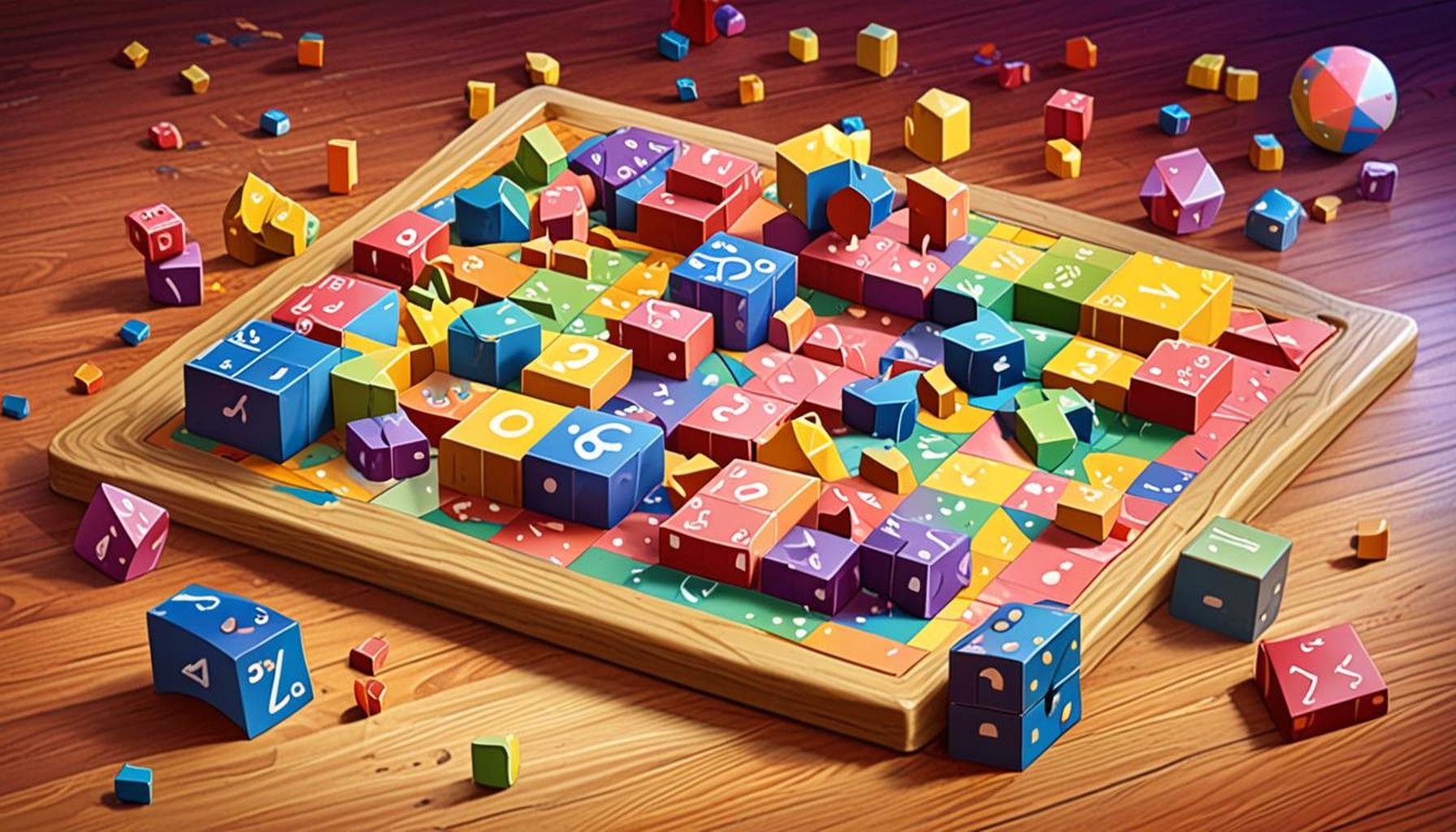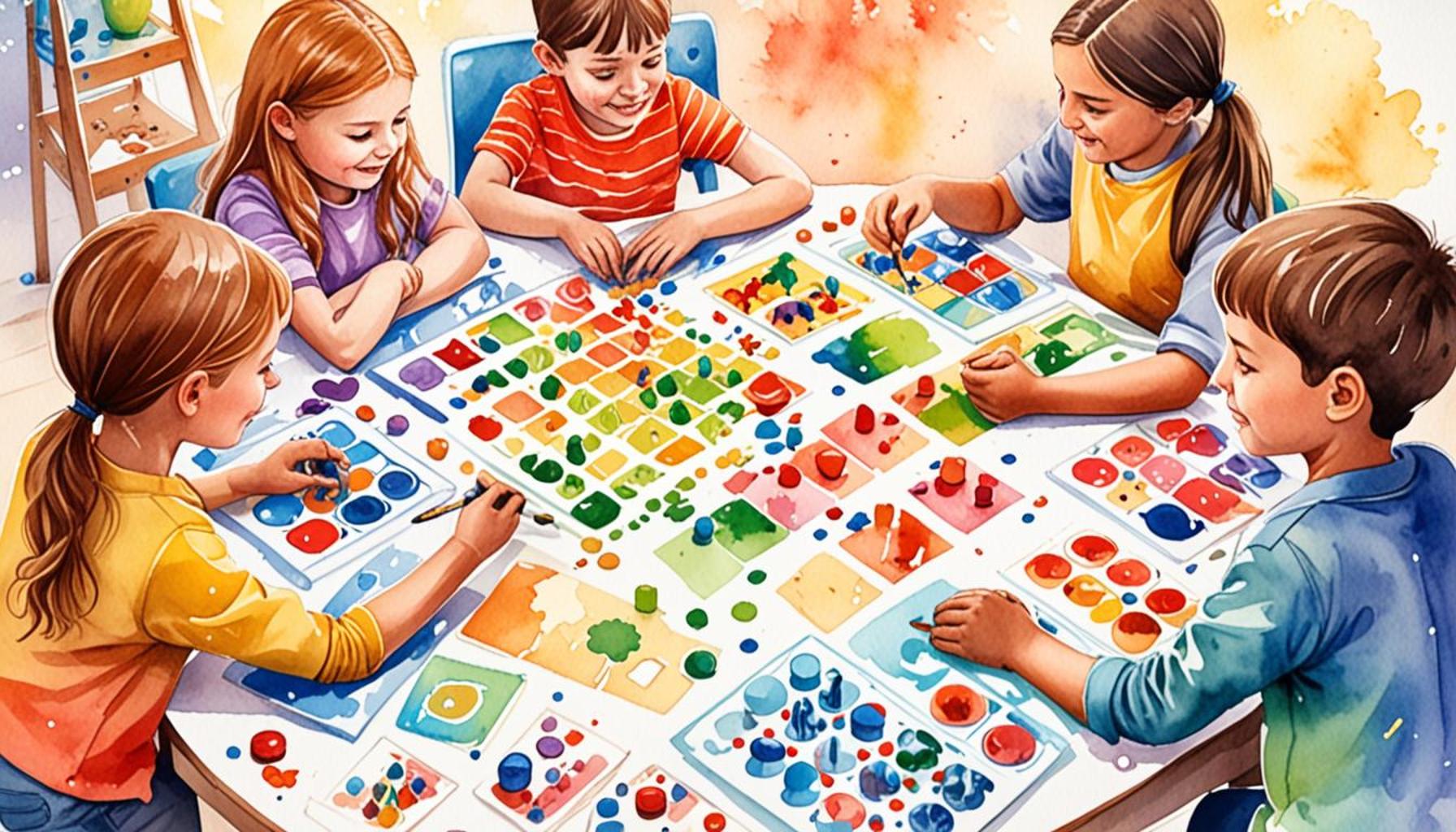The Importance of Mathematical Puzzles in Promoting Logic and Reasoning in Children

The Essential Role of Mathematical Puzzles in Cognitive Development
In an increasingly digital society, where children often find themselves engrossed in screens, the value of mathematical puzzles stands out as a vital aspect of holistic development. These engaging challenges are not merely recreational; they serve as critical instruments in nurturing essential cognitive and social skills among youth. By immersing children in puzzles, we can unearth a myriad of benefits that go far beyond numbers.
Enhancing Logical Thinking
When children engage with puzzles, they are required to think critically and systematically. For instance, a simple logic puzzle such as “the farmer, the wolf, the goat, and the cabbage” requires students to devise a step-by-step plan to safely transport all parties across a river. Using logical sequences like this helps children understand cause-and-effect relationships and enhances their problem-solving skills.
Boosting Reasoning Skills
Puzzles act as platforms where kids can hone their reasoning abilities. As they manipulate information to come to conclusions, they learn to analyze various outcomes. Consider the classic Sudoku: players must deduce the numbers that fit within the grid, cultivating both analytical thinking and pattern recognition. Such activities encourage children to ask questions, investigate possibilities, and be curious about the world around them.
Promoting Persistence
Mathematical puzzles often come with difficulty levels that require time and effort to solve. The act of navigating through these challenges teaches children the importance of perseverance. They learn that failure is a part of the journey, and with grit and determination, they can achieve their goals. A child struggling to figure out a complex math riddle learns to embrace challenges, a lesson that is invaluable in academic settings and beyond.
Aiding Academic Performance
Research has underscored that children who regularly interact with mathematical puzzles often show improved performance in traditional math assessments. This is not just anecdotal; the hands-on experience gained through puzzles can solidify mathematical concepts in a child’s mind. As they play, they develop a strong foundation in numeracy that translates into better grades.

Encouraging Collaboration
Many mathematical puzzles can be approached collaboratively, fostering teamwork among peers. Solving puzzles in groups allows children to communicate effectively, share diverse perspectives, and build camaraderie. Activities like escape rooms or puzzle contests can be particularly effective in schools or community programs, bringing kids together while sharpening their mathematical skills.
Given the abundance of benefits associated with mathematical puzzles, it becomes imperative for educators and parents alike to integrate these brain-teasers into children’s daily lives. By doing so, we can ignite a passionate engagement with learning, shaping future generations into adept thinkers and problem-solvers. Whether participating in a school math club or solving puzzles at home, the journey begins now, and the possibilities are endless.
DISCOVER MORE: Click here to learn how word games can boost your creativity and problem-solving skills
Unlocking Cognitive Skills Through Fun Challenges
Mathematical puzzles have emerged as a quintessential medium for fostering essential cognitive skills in children. Beyond entertainment, these engaging activities provide a robust framework for developing logic and reasoning abilities. Daily encounters with intriguing challenges can significantly enhance children’s understanding of fundamental concepts, paving the way for a brighter academic future.
Fostering Critical Thinking
Engagement with mathematical puzzles places children in scenarios where they must utilize critical thinking to unravel the mysteries presented. For example, consider a puzzle that requires filling a grid with numbers while adhering to specific constraints. Such tasks encourage children to assess different strategies and outcomes, contributing to a deeper understanding of logical relationships. As kids navigate through these puzzles, they learn not only to follow rules but also to create them, a pivotal step in honing their independent thinking skills.
Empowering Analytical Skills
The analytical prowess required to tackle various mathematical puzzles is indispensable in today’s data-driven world. By working through numeric riddles, children cultivate their ability to interpret and analyze information effectively. This benefit extends beyond mathematics; strong analytical skills can help them succeed in subjects like science, where hypothesis testing and data evaluation are vital. Encouraging kids to engage with puzzles that challenge their analytic comfort zones can yield rich development in their cognitive abilities.
Developing Social Interaction
Mathematical puzzles offer a unique opportunity for social engagement. When children collaborate on problem-solving tasks, they learn to communicate effectively and express their thought processes. This collaboration also fosters a sense of community and belonging, which is essential for emotional and social development. Group activities such as math relay races or interactive puzzle-solving workshops can enhance these learning experiences, making math not just an individual endeavor but a shared journey.
Understanding Concepts through Practice
One of the most compelling reasons to integrate mathematical puzzles into education is their ability to solidify complex mathematical concepts through practical application. By encountering real-world math scenarios embedded within puzzles, children can more easily comprehend and remember intricate ideas. As they grapple with these challenges, they move from rote memorization to a place of understanding, making it easier for them to retain information and apply it in future academic settings. Educational consultants emphasize that kids who regularly incorporate puzzles into their learning are often better equipped to tackle standardized tests.
Engaging with Diversity in Problem Solving
Mathematical puzzles come in various forms, catering to different interests and abilities. This diversity enables educators and parents to customize learning experiences to suit individual needs. Some engaging types of puzzles include:
- Logic puzzles that sharpen deductive reasoning
- Crosswords with mathematical terms to expand vocabulary
- Riddles that require lateral thinking to yield solutions
- Pattern recognition games to build spatial awareness
The accessibility of these puzzles ensures that all children have the opportunity to engage with mathematics in a way that resonates with them. Ultimately, by embedding mathematical puzzles into children’s routines, we create fertile ground for their cognitive seeds to grow.
| Category | Description |
|---|---|
| Cognitive Development | Mathematical puzzles encourage critical thinking, enabling children to identify, analyze, and solve complex problems effectively. |
| Engagement and Motivation | Puzzles transform learning into an engaging activity; children are more likely to persist in challenging tasks when they find them enjoyable. |
Incorporating mathematical puzzles into children’s learning routines can lead to exceptional advancements in their logical reasoning abilities. For instance, children exposed to various puzzles develop enhanced problem-solving skills. They learn to evaluate different strategies and approaches, which is essential for mastering more complex mathematical concepts as they grow.Additionally, research indicates that when children encounter fun challenges through puzzles, they display greater enthusiasm for mathematics as a whole. This positive association between enjoyment and education fosters a lifelong interest in math, paving the way for a brighter academic future. These engaging challenges not only improve their cognitive skills but also promote essential soft skills such as perseverance and creativity.As a result, it becomes increasingly clear that integrating mathematical puzzles into educational curricula can yield substantial benefits, equipping children with the necessary tools to thrive not only in mathematics but also in various aspects of their lives.
DISCOVER MORE: Click here to dive deeper
Enhancing Problem-Solving Abilities and Creativity
Mathematical puzzles serve as a vibrant springboard for enhancing children’s problem-solving abilities and stimulating their creativity. Engaging with puzzles cultivates an environment where children can think outside the box and devise innovative solutions to complex problems. These activities not only challenge children intellectually but also encourage them to explore various avenues before arriving at the correct answer. For instance, when faced with a tricky counting puzzle, children learn to approach the problem from multiple angles—an ability that is essential in any future career path they may choose.
Building Resilience Through Trial and Error
Working through mathematical puzzles inevitably involves a degree of trial and error. As children attempt to solve these problems, they often encounter obstacles that require persistence and resilience to overcome. A notable study from the American Psychological Association found that children who engage in puzzles are more likely to demonstrate improved coping strategies when faced with challenging tasks in academic settings. This resilience fosters a growth mindset, where children begin to view challenges as opportunities for learning rather than roadblocks. In doing so, they cultivate a robust approach to problem-solving that will serve them well in their future educational pursuits and beyond.
Integrating Technology into Learning
In today’s digital age, mathematical puzzles can be easily integrated into technology-based learning platforms. Educational apps and websites have emerged, offering a wide range of interactive math puzzles that are visually engaging and easily accessible. Programs like Prodigy Math and Mathletics provide children with tailored experiences, allowing them to practice their skills while enjoying an immersive learning atmosphere. Incorporating technology in this way not only captivates children’s interests but also aligns with current educational trends that emphasize digital literacy. Research by the International Society for Technology in Education suggests that such tools can significantly improve mathematical understanding among children, positioning them for academic success in our increasingly digitized world.
Encouraging Self-Directed Learning
Mathematical puzzles encourage children to engage in self-directed learning, an essential skill for lifelong education. When children encounter challenges independently, they take ownership of their learning process, developing autonomy and initiative. This self-direction is critical as they transition into middle and high school, where they must rely on their ability to immerse themselves in complex subjects. Educational experts argue that fostering self-directed learning early in life leads to greater academic achievements and nurtures a love for learning that extends well beyond math. Puzzles that challenge children to think critically and creatively can be a catalyst for this essential aspect of their growth.
Highlighting the Importance of Play in Learning
Moreover, the playful nature of mathematical puzzles underscores the importance of play in educational environments. Researchers from the University of Cambridge have highlighted that play is essential for healthy cognitive development, allowing children to explore, experiment, and learn in a non-threatening context. When children solve puzzles, whether they are logic games or number challenges, they experience enjoyment during the learning process, which in turn, enhances their engagement and retention of information. As children discover mathematical concepts through play, they develop a more positive attitude toward mathematics, combating the common anxiety many face in subjects perceived as difficult.
DISCOVER MORE: Click here to learn about visual therapy and stress relief
Conclusion: A Gateway to Critical Thinking
In summary, the role of mathematical puzzles in promoting logic and reasoning in children cannot be overstated. These engaging activities not only foster problem-solving abilities but also stimulate creativity and encourage resilience through the embrace of trial and error. By examining various approaches to challenging puzzles, children develop essential skills that will aid them in their educational journey and in their future careers.
Moreover, with the integration of technology into modern learning, children can access a plethora of interactive math puzzles that captivate their interest while reinforcing core mathematical concepts. Platforms like Prodigy Math and Mathletics exemplify how technology can enhance a child’s learning experience, making math both accessible and enjoyable. Emphasizing self-directed learning further prepares children for the independence required in higher education, encouraging them to take the initiative in their studies.
As we recognize the value of play in the learning process, mathematical puzzles emerge as a compelling way to combine enjoyment with education. This playful approach can dismantle the anxiety many children feel toward mathematics, allowing them to view challenges as exciting opportunities for discovery. The evidence is clear: when children engage with mathematical puzzles, they not only enhance their cognitive abilities but also cultivate a lifelong love for learning.
Thus, educators, parents, and policy makers should embrace and promote the incorporation of mathematical puzzles into the learning experience, ensuring that children are equipped with the critical thinking skills necessary to thrive in an increasingly complex world.


